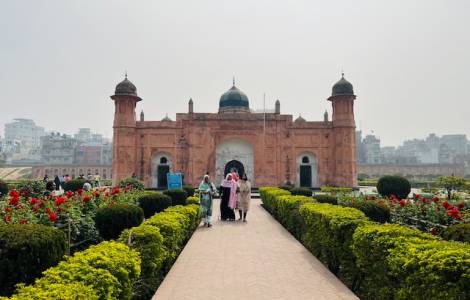
(Abdullah Al Imran - Unsplash)
Dhaka (Agenzia Fides) - "Dear Muslim brothers and sisters, every year you celebrate Eid-ul-Azha, the 'Feast of Sacrifice', to obtain God's blessings. In the Old Testament of the Holy Bible, we see that men of faith sacrifice their best things. In the Old Testament, Abraham was ready to sacrifice his son to God. The distribution of meat to the needy, on the occasion of the feast, is another significant moment of Eid-ul-Azha. Muslims and Christians believe that sacrifice to God is fruitful. If we make sacrifices with a pure heart, the Lord accepts our sacrifices and blesses us": it is with these words that Msgr. Lawrence Subrata Hawlader, Archbishop of Chittagong and President of the Episcopal Commission for Christian Unity and Interreligious Dialogue, addresses the Muslim faithful on the occasion of the Muslim holiday celebrated in Bangladesh on June 29, in a message broadcast throughout the country and published in the Bangladeshi national Catholic weekly "Pratibeshi". On this important Islamic holiday, Muslim believers around the world slaughter an animal - goat, sheep, cow or camel - to remember and reflect on the story of the Prophet Ibrahim (Abraham) sacrificing his son for the love of God. Archbishop Hawlader says all believers appreciate and are called to "a contrite spirit of sacrifice to God". The spirit of sacrifice is also expressed in solidarity with one's neighbour, as is the case during Eid-ul-Azha. "The Lord - he wrote in the message - can see everyone's hearts and behaviors. He wants people to sacrifice themselves and put aside envy, conflict, and discrimination to create a society made up of good relationships and brotherhood. Nowadays, this type of sacrifice is required of people of Hindu, Muslim, Christian and Buddhist faith. If this happens, the spirit and meaning of Eid-ul-Azha will be to make continuous sacrifice and self-purification".
The spirit of brotherhood and mutual blessing permeates the celebration of the festival in Bangladesh, a country with a strong Muslim majority, and is expressed in gestures of closeness and brotherhood between Christian and Muslim faithful. Many of the latter invite Christian friends and friends of other faiths to share the joy, thus helping to create a relationship of brotherhood. The same is true, conversely, during solemn occasions such as Christmas or Easter Sunday, when it is believers in Christ who invite friends of the Muslim faith to their homes. On all these occasions, greetings are exchanged and one participates in the spiritual afflatus of one's neighbor. In recent years, the Catholic Church in Bangladesh, with the aim of strengthening Islamic-Christian relations, has encouraged joint reading, reflection and discussion on documents such as Pope Francis' encyclical "Fratelli Tutti" and the "Document on “Human Fraternity for World Peace and Living Together”, also known as the "Abu Dhabi Declaration", finding fertile ground with Muslim religious leaders and leaders of important Islamic institutions, who have deeply appreciated these texts. The attitude of seeking harmony and cooperation is also reflected in relations between ordinary people: "I will go to the house of my Muslim friend Farhad Hossain who invited me. I will convey to him and to all members of his family, my greetings and my best wishes for Eid-ul-Azha. We will share moments of celebration, in simplicity and brotherhood, listening to music and tasting delicious dishes. With him, it's like family", Catholic Subash Gomes, head of an NGO in Dhaka, told Fides. In turn, Gomes invited his friend Farhad Hossain to his home for Christmas and Easter, sharing the spiritual and material joy of these celebrations: small but significant gestures that contribute to creating a climate of brotherhood between people of different faiths in a pluralistic society. (PA/FC) (Agenzia Fides, 28/6/2023)